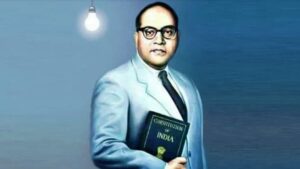

Mahaparinirvan Diwas
December6 is observed as the death anniversary, or the Mahaparinirvan Diwas,of Dr BR Ambedkar.He was the chief architect of the Constitution of India.Dr. BR Ambedkar was a famous Indian jurist, politician, economist, social reformer.He worked very hard to inspire the Dalit Buddhist movement as well as the rights of women and labour.
Dr. Babasaheb Ambedkar was born ,on 14th April 1891 in Mhow, Madhya pradesh.His father name was Ramani Sakpal and his mother name was Bhimabai Sakpal.H8s father was a in the British army.in those days the government ensured that all the army personnel and their children were educated and they ran special school for this purpose this ensured good Education for Bhimrao.
Despite many difficulties young Bhimrao never lost heart.By the quality of his hard work, determination and commitment he earned several scholarship to support his education.
Inspirational and Famous quotes by Dr. Babasaheb Ambedkar
- “I measure the progress of a community by the degree of progress which women have achieved.”
- “I like the religion that teaches liberty, equality and fraternity.”
3.Cultivation of mind should be the ultimate aim of human existence.”
4.Life should be great rather than long.”
- “Indifferentism is the worst kind of disease that can affect people.”
- “A bitter thing cannot be made sweet.The taste of anything can be changed.But poison cannot be changed into nectar.”
- “A great man is different from an eminent one in that he is ready to be the servant of the society.”
8.Constitution is not a mere lawyer’s document, it is a vehicle of Life, and its spirit is always the spirit of Age.”
9.is not enough to be electors only.It is necessary to be law-makers;otherwise, those who can be law-makers will be the masters of those who can only be electors.”
10.”If you study carefully, you will see that Buddhism is based on reason. An element of flexibility is inherent in it, which is not found in any other religion.”
quotes in Marathi
1.जसा माणूस उपासमारीने अशक्त होऊन अल्पायुषी होतो,
तसा तो शिक्षणाअभावी जिवंतपणी दुसऱ्याचा गुलाम होतो..
– डॉ. बाबासाहेब आंबेडकर
2.शोधावया भाकरीला निघाली ती भूक आहे..
जन्मताच गरीबी येते ही कुणाची चूक आहे..
भूक लागली की खाणे ही प्रकृती आहे…
घासातील घास दुसऱ्याला देणे,
ही मराठी माणसाची संस्कृती आहे..
डॉ. बाबासाहेब आंबेडकर..!
3.तुमच्याकडे २ रुपये असतील,
तर १ रुपयाची भाकरी घ्या,
आणि १ रुपयाचे पुस्तक..
भाकरी तुम्हाला जगण्यास मदत करेल,
तर पुस्तक ‘जगावे कसे’ हे शिकवेल..
– भारतरत्न डॉ. बाबासाहेब आंबेडकर
4.जसा माणूस उपासमारीने अशक्त होऊन अल्पायुषी होतो,
तसा तो शिक्षणाअभावी जिवंतपणी दुसऱ्याचा गुलाम होतो..
– डॉ. बाबासाहेब आंबेडकर
5.फक्त वही आणि पेन म्हणजे शिक्षण नाही,
तर.. बुध्दीला सत्याकडे, भावनेला माणूसकीकडे,
आणि शरीराला श्रमाकडे नेण्याचा मार्ग म्हणजे शिक्षण..
जसे, जेवल्यावर होणारे समाधान तात्पुरते असते..
याउलट शिक्षणामुळे मिळणारी ज्ञानाची शिदोरी आयुष्यभर पुरते..
– डॉक्टर बाबासाहेब आंबेडकर
बाबासाहेब आंबेडकर महापरिनिर्वाण दिन विनम्र अभिवादन मराठी संदेश
- विश्वरत्त, भारतरत्त, प्रज्ञासूत्र, क्रांतिसूर्य,
भारतीय घटनेचे शिल्पकार, उद्धारकर्ते,
महामानव, परमपूज्य, बोधीसत्व,
डॉ. बाबा साहेब आंबेडकर यांच्या
महापरिनिर्वाण दिनानिमित्त..
त्यांच्या विचारांना व त्यांना
विनम्र अभिवादन आणि कोटी कोटी प्रणाम!
- सागराचे पाणी कधी आटणार नाही,
भिमाची आठवण कधी मिटणार नाही,
अरे एकच जन्म काय हजार जन्म घेतले तरी,
आपल्याकडून बाबासाहेबांचे उपकार कधी फिटनार नाही..
- ज्या व्यक्तीस भारतात पुस्तके वाचू दिली नाहीत,
त्याच व्यक्तीने असे पुस्तक (भारतीय संविधान) लिहिले की,
ज्याने आज भारत देश चालतोय..
अश्या महामानवाच्या पुण्यतिथीनिमित्त विनम्र अभिवादन..!
- प्राणाची आहुती दिली, आमच्या जीवनासाठी..
त्रास भोगला किती, आमच्या हसण्यासाठी..
कसे विसरू बाबा तुमचे उपकार,
हा जन्म वाहिला मी फक्त तुमचे गुणगान गाण्यासाठी..
डॉ. बाबासाहेब आंबेडकर महापरिनिर्वाण दिना निमित्त,
विनम्र अभिवादन !
- आमच्या डोक्यावर ना कोण्या आमदाराचा हात आहे..
ना कोण्या खासदाराचा हात आहे..
पण ज्याचा हात आहे, तो सगळ्यांचा बाप आहे..
विश्वरत्न डॉ बाबासाहेब आंबेडकर आपणास कोटी कोटी प्रणाम..!
- शोधावया भाकरीला निघाली ती भूक आहे..
जन्मताच गरीबी येते ही कुणाची चूक आहे..
भूक लागली की खाणे ही प्रकृती आहे…
घासातील घास दुसऱ्याला देणे,
ही मराठी माणसाची संस्कृती आहे..
डॉ. बाबासाहेब आंबेडकर..!
This are some quotes of Dr. Babasaheb Ambedkar father of Indian constitution in Marathi and English.I hope this Article is helpful to you.
